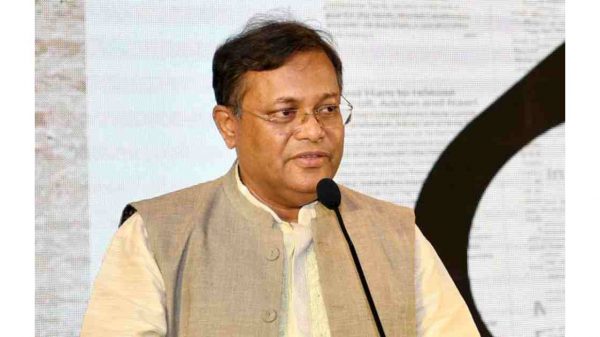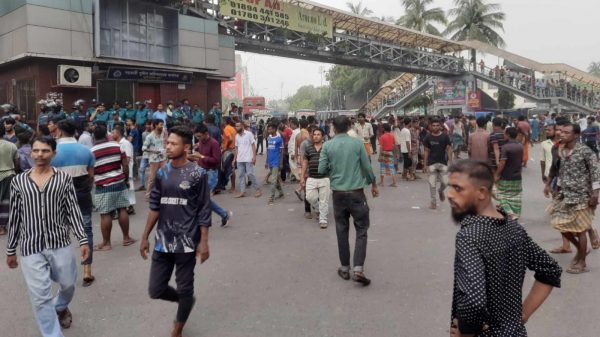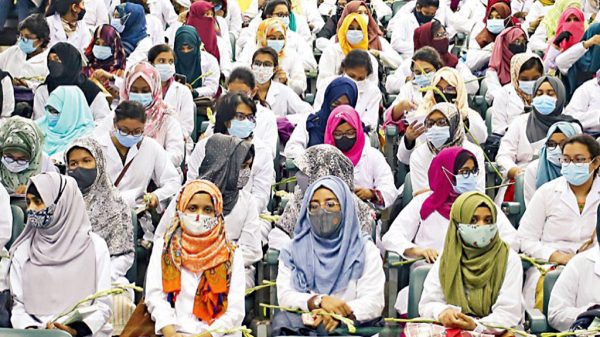Closer to confrontation?

Afsan Chowdhury:
THE kind of effort that the Awami League is putting in trying to minimise the presence at BNP gatherings seems a bit odd given recent political records. Not only have various transports been delayed or stopped, but buses have gone on strike around meeting dates. Several BNP members have reportedly been waylaid, harassed and assaulted, the BNP says.
The arrest of the Mahila Dal general secretary was about sending a message that the Awami League was not going to be a pushover in this contest. It is also ready to play hardball. But that has, in fact, reinforced the feeling that the Awami League is taking the BNP much more seriously than it had done after 2018. And the BNP’s tactics of meetings to mobilise the street are working to an extent not expected by the Awami League.
What is different now?
THE BNP feels stronger because of three main reasons.
— Sanctions by the US against the Rapid Action Battalion and its senior officials have been a game changer as the government has been forced to use restraints. Its law enforcers were free to act before as they thought needed but their behaviour is now under considerable scrutiny. The sanctioned and their fellow enforcers feel that the actions, if publicly exposed, may lead to more international action as well. The previous inspector general of police looked very vulnerable in the end and it has been a lesson learnt.
— Bangladesh official work force, both amlas and law enforcers, had always been under scrutiny by various security agencies. The government was aware that many were not politically loyal even though most recruitment did carry political approval seals. They are like all people, selfish first, loyal second. However, as reports show, many of them have now been removed because of their possible links with the opposition. Those officials probably felt that they needed to insure their future in the case of a regime change. And the BNP has already threatened to take action against many officials and the police if they come to power.
— The ruling party had a stranglehold on the local media but no control over expatriate media. Thus, social media located outside Bangladesh has been more effective than pro-government media, including mainstream ones, in public opinion mobilisation. Local activist media are under the local laws like the Digital Security Act, etc, but they do not apply to the expat media. The government’s efforts to muzzle them, including the arrest of their relatives here, have not worked. And these people can use any language and make fun of the top leaders in a way that cannot be done by the local media. It is social media-based and that is why it reaches many.
Factors making political space more level
TWO factors have helped the opposition to stand up more than before. One is current global economic conditions that are adverse towards any government, including in Bangladesh. The Sri Lankan example acted as a spurt to the opposition as it saw a display of what is called people’s power. It basically means that the crowds can force a government to move out and a new one takes over.
The other was the policy of rewarding loyalty through opportunities of high corruption. People were paying for both public and private sector corruption. Haldar and his kinds hit the middle class hard, but there are millions. Corruption in the health, infrastructure and other sectors diluted the general appeal level of achievements which the government had made. Although people tolerate corruption, resentment grows. They can ignore when things are not tough, not when it is like now. Rough economic weather makes crony corruption go higher.
Local factors
THE Awami League is not coming down hard yet even as the BNP gathers momentum, nor is it seriously taking any counter-measures. This probably means that the Awami League is getting ready with some mid- and long-term plans and not just reacting to BNP provocations. It has continued with low-key arrests and will probably do more as December arrives. Obviously, the BNP’s call that December is the deciding month is something that the Awami League must respond to. This may have been a bit premature on part of the BNP as it is a ‘national month’; so, activities have both party and state connotations. The BNP may be forced to act and show its muscle and the Awami League may find it more convenient to act then.
The BNP has no option to back down and must go for a ‘topple the government’ programme and that cannot be sustained for months. If the current phase continues for six more months, public fatigue may set in. Political meetings and mobilisations are not popular as it interferes with the daily lived life.
The Awami League will go for attrition and would ideally like to swim out the political waves, but once the wave is gone, the BNP may look stranded.
The opposition party took a similar strategy in 2014 which was meant to soften the government through street movements and before going for elections. But the Awami League cut them off by charging them with mass violence. This time, the BNP has refused to go to the polls under an AL government which has reduced its flexibility a bit. It has yet to give a timeline of the project completion, but the Awami League can play the waiting game, too. Permanent street movements cannot work and all must be settled by election time.
The foreign factors
AS THE world races towards a recession, no one is sure how tough things will be. People may be angrier with the government now, but whether that will translate into a national government and elections one cannot say. Ministers are not sounding very aggressive and the BNP certainly is noisier.
The Awami League also knows that it cannot succumb to any elections after being toppled. It is unrealistic to think that it will commit a political suicide by giving polls when the scene is the roughest for them. The series of sackings, new appointments and the rest are all part of the same preparatory scheme. The Awami League is trying to put its house in order before late 2023. One does not know how much it will succeed.
But just as the United States has become a factor in Bangladesh politics, there are two allies of Bangladesh who also matter. India matters less but China matters a lot, if not the most, and their investment is massive; so, they will protect it. For whatever reasons, China is not fond of the BNP and that is the biggest counter-balance to the United States. What can the BNP offer to make it pliable towards it?
The other player is the United States and some speculation is that the United States wants an arms deal to prove that it is not pro-China only. In that case, the incumbent is going to be in a better position to do that than the future party in power. If the push comes to shove, the Awami League will agree to what the United States wants to ensure a lower pressure. However, that involves risking China’s displeasure. So, a big game is on.
It is too early to say how things will shape up but a robustly uncertain future awaits all including all political parties.
Afsan Chowdhury is a researcher and journalist.
























Leave a Reply